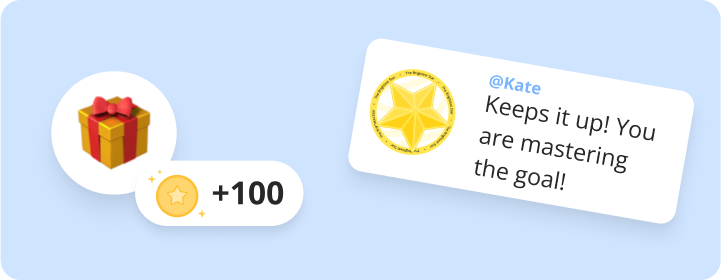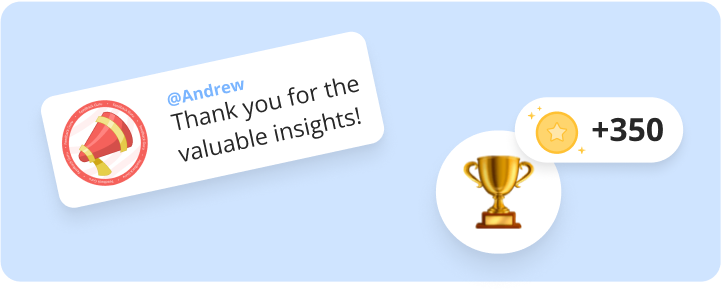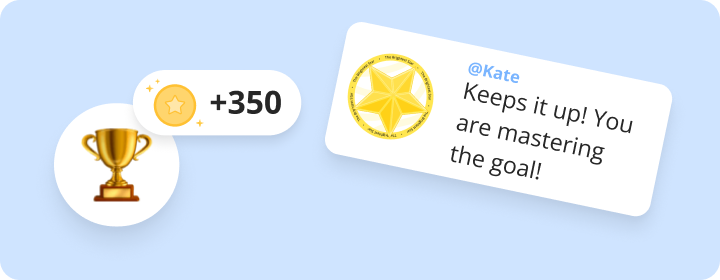Employee Recognition Awards 2025: Celebrating Excellence Guide
In 2025’s fast-paced, performance-driven landscape, employee recognition awards aren’t just a warm gesture — they're a strategic powerhouse. As organizations embrace remote, hybrid, and global working models, the need to recognize employees meaningfully becomes more critical than ever. From nurturing employee engagement to boosting employee retention, recognition isn’t a cherry on top — it’s baked into the cake of organizational success.
Here’s a number that tells the story: 69% of employees say they’d work harder if they felt more appreciated. Imagine multiplying that energy across your entire team. That’s what a well-structured employee recognition program can unlock — momentum, morale, and measurable results.
In this 2025-focused guide, we break down the strategy, psychology, and structure behind impactful employee recognition awards programs. You'll find the top 8 awards categories, 4 emerging trends, 5 strategic setup steps, and dozens of award ideas to inspire your next year award or all-company celebration.
Let’s explore how to spotlight excellence, shape culture, and make employees feel valued in every role, location, and level.
The Power of Employee Recognition in 2025
Recognition in 2025 is more than applause — it’s alignment. Recognizing and rewarding exceptional contributions helps reinforce company values, fuel customer satisfaction, and drive long-term organizational goals.
A robust recognition program:
Increases motivation in over 70% of engaged employees
Reduces turnover by 31% (Gallup)
Improves employee satisfaction, especially in distributed and hybrid teams
Encourages frequent recognition across levels
Strengthens team members’ connection to purpose and people
Recognition builds a positive work environment where ideas thrive, feedback flows, and achievement gets noticed. From peer to peer recognition to structured employee awards, recognition fosters loyalty and high performance.
Top 8 Employee Recognition Awards for 2025
Every award serves a purpose — and every name can inspire action. In 2025, when employee engagement and employee retention are more vital than ever, choosing the right employee recognition awards is more than symbolic — it shapes your company culture. These categories not only celebrate outstanding performance but reinforce the values and behaviors that matter most.
Here are the top 8 essential awards every modern employee recognition awards program should feature:

🏆 1. Employee of the Year
Often the crown jewel of your employee awards program, the Employee of the Year is more than a title — it’s a message. This most valuable employee award recognizes a consistently high-performing, values-driven individual who contributes across the board. Their impact spans productivity, culture, mentorship, and innovation. They’re someone who doesn’t just meet goals — they elevate the goals of other team members. Ideal for reinforcing long-term dedication, cross-functional leadership, and strategic alignment, this award sets a high bar and tells every employee: this is what excellence looks like here.
💡 2. Innovation Award
This award celebrates thinkers, dreamers, and doers. Recognizing those who drive innovative ideas and creative solutions, the Innovation Award honors individuals or teams who take smart risks, introduce new processes, or influence product/service evolution. Whether they’ve launched a new internal tool, solved a systemic problem, or changed how customers experience your brand — this award communicates that fresh thinking is fuel for the organization’s success. It’s also a great way to encourage a “fail forward” mindset across your entire team.
🤝 3. Team Player Award
No successful company thrives on solo players alone. The Team Player Award highlights employees who prioritize collaboration, lift others, and consistently contribute to a positive workplace culture. These individuals are the glue — jumping into group projects, smoothing out friction, mentoring new hires, and quietly ensuring team health and morale. This award serves as a powerful reminder that success is shared, and recognizing employees for unity, not just individual achievement, fosters a deeper sense of belonging.
📞 4. Customer Service Excellence Award
In a world where customer satisfaction drives growth, this award honors employees who go beyond support — they become brand ambassadors. Whether on the sales team, in tech support, or client success, these awardees are known for their exceptional service, empathy, and problem-solving skills. Their feedback loops improve products. Their tone builds loyalty. The Customer Service Excellence Award is also a great tie-in to NPS or CSAT metrics, making it easy to track outcomes and highlight impact.
💼 5. Leadership Award
Not every leader has a title, but every title needs leadership. The Leadership Award recognizes individuals who demonstrate strong leadership skills, influence others positively, and help steer both people and projects forward. These employees may lead a team, a community initiative, or a pivotal cross-functional effort. They may embody mentorship, resolve conflicts, and advocate for professional development opportunities. Recognizing leadership early encourages growth and signals a clear internal path to advancement.
✨ 6. Spotlight Award
Some of your greatest contributors may not always be in the limelight — but their exceptional contributions are foundational. The Spotlight Award highlights quiet achievers — the analysts, administrators, designers, and behind-the-scenes stars whose excellence powers success without fanfare. This award often creates emotional resonance and demonstrates that every role — no matter how internal — is vital. It also sends a clear message that employees feel appreciated no matter their visibility.
❤️ 7. Social Contributor Award
Company culture is built in the spaces between meetings. The Social Contributor Award celebrates individuals who cultivate connection, inclusion, and joy. From organizing volunteer events and DEI initiatives to welcoming new hires or even just maintaining your Slack meme channel, these people shape how your workplace feels. This award is a great example of how to recognize employees for intangibles like emotional intelligence, team spirit, and positive work environment contributions.
🎓 8. Mentorship Award
Behind every high-potential employee is someone who helped them rise. The Mentorship Award honors those who invest time, energy, and wisdom into the development of others. This can include coaching, peer shadowing, training, or creating growth frameworks. It aligns directly with professional development and employee retention, and emphasizes that growth is a team effort. Recognizing mentors sends a message to the entire company: lifting others is part of leadership.
Now that we've explored the types of awards that resonate most with employees in 2025, it's time to go one level deeper: why do these awards matter so much? Why invest in them at all?
The answer lies not just in the smiles and celebration — but in the measurable outcomes. Let’s take a closer look at the ripple effect these recognition efforts can have on performance, retention, and culture.
4 Reasons Awards Drive Retention, Morale & Motivation
When done intentionally, awarding employees is more than a gesture — it's a strategic business decision that directly affects productivity, loyalty, and growth. Here’s why recognition matters in measurable ways:

1. Boosts Retention
Employees who feel valued are far more likely to stay. Recognition programs help reduce voluntary turnover by up to 59% and lower absenteeism by 41%. A single award can validate an employee’s contribution, but a culture of recognition encourages long-term loyalty and decreases hiring costs.
2. Improves Engagement
Engaged employees are 17% more productive, and recognition is a major driver of that engagement. When people know their efforts are seen and appreciated, they’re more likely to take ownership, support organizational goals, and go the extra mile.
3. Inspires Healthy Competition
Employee recognition awards create visible milestones that motivate others. When done right, this isn’t about rivalry — it’s about aspiration. Employees who see their peers celebrated are more likely to reflect on their own impact and strive for exceptional performance.
4. Promotes Peer Recognition
In 2025, appreciation isn’t just top-down — it’s peer-to-peer. Great programs enable team members to recognize one another, strengthening bonds and creating a shared accountability for culture. This horizontal approach helps build connection across roles and departments.
Put simply: when you embed recognition into your everyday culture, you don’t just motivate — you multiply impact.
Understanding the impact of awards is one thing — but staying ahead of the curve is another. The way companies approach recognition is evolving rapidly. Let’s dive into the emerging trends shaping the future of employee recognition in 2025.
Future Recognition Trends to Watch in 2025
The workplace is evolving — and so are the ways we recognize employees. To keep your employee recognition program fresh, relevant, and impactful, it's crucial to stay in tune with shifting employee expectations and new technologies. Recognition in 2025 is about personalization, sustainability, and empowerment. Here are four key trends redefining the future of recognition this year:

1. AI-Powered Recognition Insights
Artificial intelligence is transforming how we understand and optimize the award process. AI can:
Recommend award winners based on performance data, peer feedback, and project outcomes
Analyze past recognition patterns to uncover bias or gaps
Automate nominations and surface unsung heroes
By making recognition more data-informed and inclusive, AI ensures every employee — not just the loudest voices — has a chance to be celebrated for their exceptional contributions.
2. Personalized Awards & Gifting
Forget the generic plaque. In 2025, recognition is tailored to the individual. Companies are increasingly offering:
Custom award messages or videos
Digital gift cards with personalized recommendations
Choice-driven rewards based on employee preferences (e.g., books, wellness kits, learning credits)
Personalization makes the recognition award more meaningful and shows that you see the whole person — not just the job title. It deepens emotional connection and reinforces job satisfaction.
3. Sustainable Recognition
Employees today care deeply about values, and that includes how recognition is delivered. The move toward sustainability is transforming the awards program in three major ways:
Replacing trophies with digital badges or NFT-style certificates
Offering charity donations in honor of award recipients
Using eco-conscious packaging for physical gifts
By aligning your recognition with social and environmental responsibility, you show employees that what you stand for matters — and it encourages engaged employees to stay and contribute.
4. Gamified Recognition Ecosystems
Gamification isn’t just fun — it’s functional. Companies using platforms like Esteeme are designing entire employee recognition ecosystems where employees:
Earn points or coins for peer recognition, milestones, or cultural contributions
Trade points in a curated gift store
Participate in friendly team challenges, leaderboards, or theme-based badges
Gamification keeps recognition visible, frequent, and interactive. It fosters healthy competition, supports team members, and turns everyday appreciation into an engaging experience.
Recognition in 2025 is no longer an annual event — it’s a living system. From tech-driven transparency to values-led rewards, these trends are not just innovations — they’re expectations.
Up next, let’s walk through the practical side: how do you actually build a recognition program that incorporates these trends and delivers real impact? Get ready for a step-by-step guide to creating your awards strategy.
Summary: Make Recognition Count in 2025
In 2025, employees want more than a paycheck — they want purpose, connection, and recognition. A powerful employee recognition awards program helps you deliver all three.
When you reward employees for exceptional contributions, promote positive work environments, and celebrate every win — you build trust, alignment, and long-term loyalty. Recognition isn’t just a feel-good moment — it’s a strategic culture accelerator.
The best part? With tools like Esteeme, scaling meaningful recognition is easier than ever.
At Esteeme, we’ve helped companies around the world build award-winning recognition programs that actually work.
Whether it’s:
Automating your recognition program
Personalizing award messages
Launching a digital gift store
Creating badges for outstanding performance
Tracking impact and participation
Esteeme makes it simple, scalable, and fun.
🚀 Ready to elevate recognition across your entire team? 👉 Book a demo now and create a culture where every contribution counts.
FAQs
- Most companies start with 5–8 core categories. Add 1–3 fun or culture-based awards to make it unique.
- Include custom messaging, visuals, and name-specific shoutouts. Skip the generic.
- Run formal awards annually or bi-annually. Add monthly or quarterly spotlights to keep recognition flowing.
- Expect gains in retention (up to 59%), engagement (17%+), and reduced absenteeism (41% lower) when done well.
- Esteeme automates nominations, enables peer-to-peer recognition, offers gamified points, and manages your entire awards program in one place.







